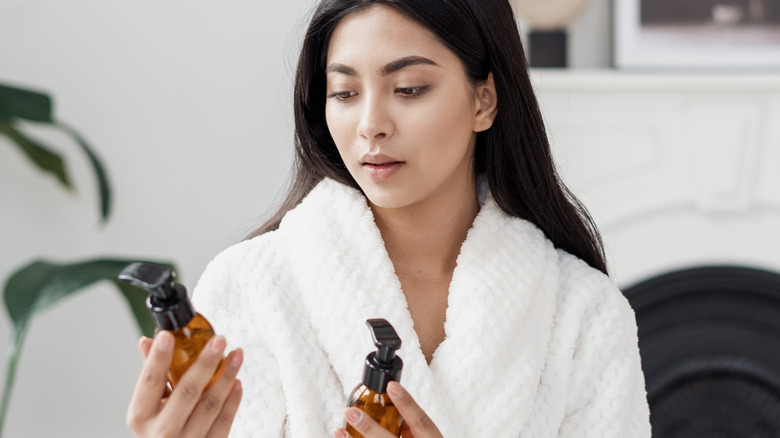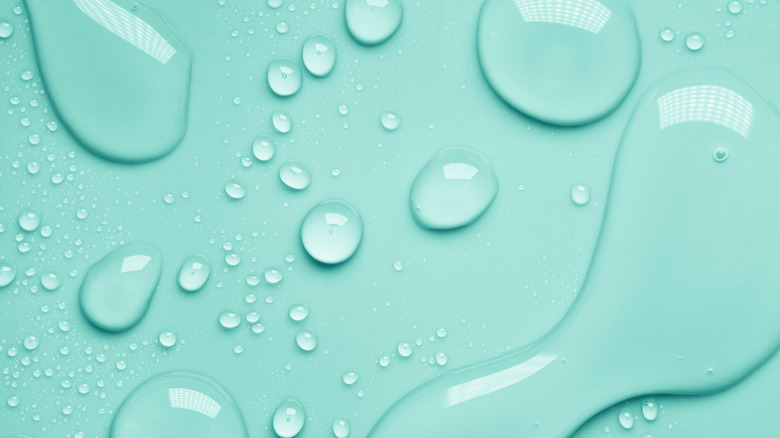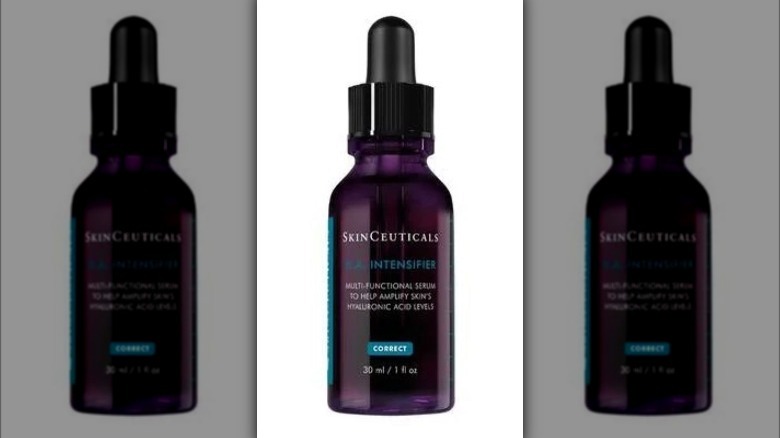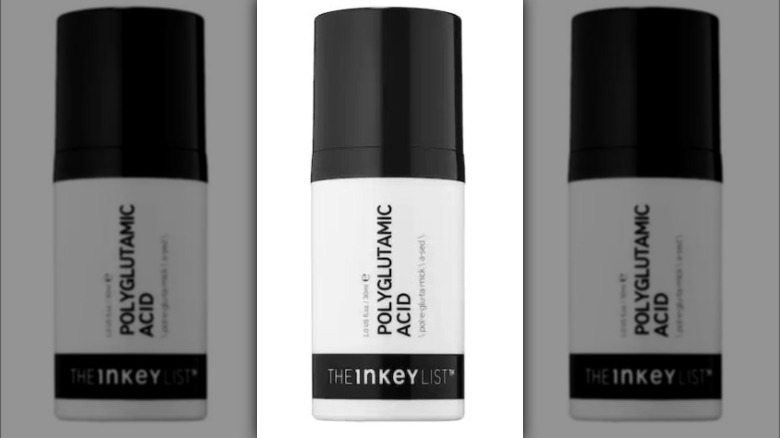Polyglutamic Acid Vs. Hyaluronic Acid: What's The Difference?
We may receive a commission on purchases made from links.
All of us want healthy skin. It's important to take care of your skin by eating a healthy diet and protecting it from external factors like the sun and the environment. You probably know the importance of moisturizing your skin because dry skin is, well, no fun, but it's also not healthy. You may employ moisturizers for your skin, but you need to know what's in them. Moisturizers generally contain various ingredients that fall under three categories: humectants, emollients, and occlusives, per Medical News Today. A good moisturizer with all three ingredients is best because it will have "humectants to attract moisture, occlusive agents to retain moisture in the skin, and emollients to smooth the spaces between skin cells."
In recent years, hyaluronic acid has been all the rage in skincare, with us even finding the best hyaluronic acid serums for sensitive skin. Many brands have also been coming up with their own hyaluronic acid serums or adding this powerful ingredient to their moisturizers for extra hydration. Hyaluronic acid is a humectant that attracts and holds on to moisture on the top layer of your skin to keep it soft, plump, and hydrated, per Healthline. It has been the holy grail ingredient for dry, thirsty skin, but a new ingredient claims to be even more hydrating, which is none other than polyglutamic acid.
"It is a water-soluble peptide that is non-toxic, biodegradable, and safe for the skin," Dr. Kiran Sethi, M.D., told Elle. This lesser-known ingredient has many similarities to our beloved hyaluronic acid, but there are a few key differences.
Hyaluronic acid occurs naturally in the body, while polyglutamic acid doesn't
Hyaluronic acid is a popular hydrating ingredient used in many skincare products, but did you know it is also present in our bodies? According to Healthline, this naturally occurring ingredient is responsible for giving your skin its structure. Applying hyaluronic acid to your skin makes it look extra hydrated and healthy.
On the other hand, our body doesn't make its own polyglutamic acid. In fact, it comes from an amino acid called glutamic acid. "Polyglutamic acid is created when lots of glutamic acid molecules are linked together," scientist Michelle Wong of Lab Muffin Beauty Science told Byrdie. It's sourced from fermented soybean to use in skincare, it's also a great hydrating agent.
Polyglutamic acid holds more moisture than hyaluronic acid
You might have heard of the incredible ability of hyaluronic acid to hydrate your skin, but did you know that it can hold on to "1000 times its weight in water" (via Healthline)? That's why your skin looks and feels incredibly moisturized after using it. If you thought that was wild, wait until you hear this: Polyglutamic acid is a more powerful humectant than hyaluronic acid because it can retain even more moisture.
The exact amount is up for debate, but scientist Michelle Wong told Byrdie, "Ingredient suppliers claim it can hold 10 times more water than hyaluronic acid, which is very impressive." Iconic makeup artist Charlotte Tilbury shared with the outlet that it is four times more powerful than hyaluronic acid. Moreover, Elle and Proof Skin Solutions claim polyglutamic acid is five times stronger than hyaluronic acid in water retention. Whatever the exact number, it appears to be way more effective at holding on to moisture and keeping the skin hydrated than your favorite hyaluronic acid.
Polyglutamic acid has bigger molecules than hyaluronic acid
Both polyglutamic acid and hyaluronic acid have incredible antiaging benefits because they moisturize your skin by attracting and holding on to water, but they aren't the same size. Byrdie explained that polyglutamic acid can retain more moisture because it is bigger in size than hyaluronic acid. Due to its size, it also acts as an occlusive by forming a protective layer to minimize water loss through your skin. Since it is bigger in size, dermatologist Hadley King told Refinery29 that "it doesn't penetrate as deep into the skin" compared to hyaluronic acid.
So, it looks like though both do an incredible job supporting skin hydration, hyaluronic acid can go deeper into your skin to hydrate it. In contrast, polyglutamic acid moisturizes the surface and prevents moisture loss by creating a protective film on the skin surface. It might not be a bad idea to add both hyaluronic and polyglutamic acids into your skincare routine.
Polyglutamic acid is more expensive than hyaluronic acid
Let's talk cost. You might have seen hyaluronic acid skincare products at various price points depending on the brand, but not as many polyglutamic acid products are on the market yet. In the end, it all comes down to the price. Charlotte Tilbury shared with Byrdie that polyglutamic acid is more expensive than hyaluronic acid, which might be why we haven't seen many options, especially because hyaluronic acid is doing great for itself because of its reputation.
Polyglutamic acid is relatively new in the skincare game and needs more research, though it seems to be doing a great job. When you already have a cheaper option in hyaluronic acid, brands tend to invest in it more to make more profit (via Healthy Asks). Therefore, hyaluronic acid does seem more cost-effective for companies and consumers in comparison.
The most hydrating hyaluronic acid serums on the market
You probably already own a hyaluronic acid serum in your vanity, but if you don't, here are the best at various price points to consider. Your skin will only love you more. Byrdie loves SkinCeuticals Hyaluronic Acid Intensifier Serum, a favorite of dermatologists. In fact, New York-based dermatologist Claire Wolinsky described this serum as "a quality product with a high concentration of HA (hyaluronic acid)" to the outlet. The brand claims it also has 10% Proxylane™to give you more youthful-looking skin.
Meanwhile, Health.com loves Neutrogena Hydro Boost Hydrating Serum because, in addition to moisturizing your skin, it is also great for those with acne — and it is super affordable.
Best polyglutamic acid products to add to your routine
According to skin experts, polyglutamic acid works really well, so time will tell if it becomes a household name like its sister ingredient: hyaluronic acid. But if you can't wait and want to try it now, here are some of the best picks packed with polyglutamic acid.
Byrdie recommends Charlotte Tilbury Magic Serum Crystal Elixir with polyglutamic acid and vitamin C for healthier-looking skin. According to the brand's official website, clinical trials showed that 97 percent of users experienced extra hydrated skin immediately, and 43 percent experienced reduction in dehydration after an hour of use. It is a bit pricey, though, currently coming in at $80.
Refinery29 is a fan of Glow Recipe Plum Plump Hyaluronic Cream, which has both hyaluronic acid and polyglutamic acid to deliver uber hydrated skin from the inside and the outside. The brand claims it has ice willowherb to help with oil balance on the skin, too. This cream isn't cheap either. For an affordable pick, you can always start with Elle's choice: The Inkey List Polyglutamic Acid Hydrating Serum, which costs just under $15 at the time of writing.






